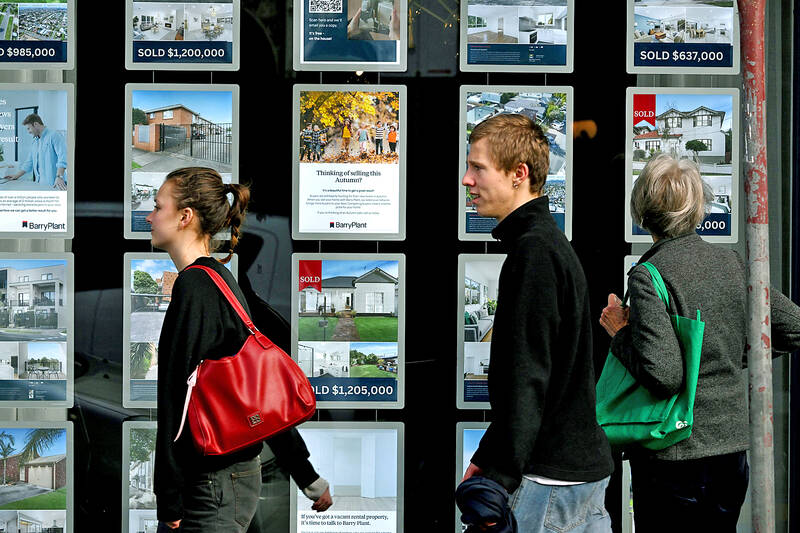Australia’s economy slowed more than expected last quarter as aggressive policy tightening weighed on household spending and construction, while accelerating labor costs underlined the nation’s inflation challenge.
The Australian dollar edged lower after GDP advanced 0.2 percent from the previous quarter, the weakest three-month expansion since September 2021 and below a forecast 0.3 percent gain, data showed yesterday.
From a year earlier, the economy grew 2.3 percent, slowing from a downwardly revised 2.6 percent.

Photo: AFP
The result is unlikely to surprise Reserve Bank of Australia (RBA) policymakers who forecast a substantial economic slowdown over the coming year.
However, an acceleration in labor costs would add to worries that price pressures are set to be prolonged even after 12 interest-rate increases since May last year.
Employee compensation accelerated to 2.4 percent in the first three months of the year — the fastest pace since June 2007 — driven by the public sector and higher than usual end of year bonuses.
Unit labor costs, or the difference between nominal wages and productivity, jumped 7.9 percent from a year ago, prompting economists at Goldman Sachs Group Inc to raise their forecast peak rate to 4.85 percent from 4.35 percent previously.
That came just hours after RBA Governor Philip Lowe highlighted a range of upside risks to the central bank’s inflation outlook, including recent wage outcomes and a rebound in house prices, saying the rate-setting board’s patience was being tested.
“Combined with today’s national accounts data showing a surprise acceleration in unit labor costs, we now expect the RBA to hike 25 basis points in July/August/September to a terminal rate of 4.85 percent,” Goldman Sachs chief economist for Australia and New Zealand Andrew Boak said. “We view the risks as skewed to a more elongated tightening cycle.”
Consumer spending growth outpaced the rise in gross disposable income, with the report showing the savings ratio fell to the lowest level in nearly 15 years, Australian Bureau of Statistics national accounts program manager Katherine Keenan said in a statement.
Household spending advanced just 0.2 percent in the first quarter, adding 0.1 percentage points to growth.
“This was driven by higher income tax payable and interest payable on dwellings, and increased spending due to the rising cost of living pressures,” Keenan added.
The GDP data follow back-to-back unexpected RBA hikes that took the cash rate to 4.1 percent, its highest level since April 2012, threatening the central bank’s goal of a soft landing. Economists see a better than one-in-three chance of an Australian recession over the next 12 months as higher borrowing costs begin to crimp domestic consumption.
“Rising interest rates are clearly biting,” Australian Treasurer Jim Chalmers said after the release. “Households pulled back on discretionary spending to make room for the essentials in their household budget. Squeezing household budgets are weighing on economic growth more broadly.”

Taiwan’s rapidly aging population is fueling a sharp increase in homes occupied solely by elderly people, a trend that is reshaping the nation’s housing market and social fabric, real-estate brokers said yesterday. About 850,000 residences were occupied by elderly people in the first quarter, including 655,000 that housed only one resident, the Ministry of the Interior said. The figures have nearly doubled from a decade earlier, Great Home Realty Co (大家房屋) said, as people aged 65 and older now make up 20.8 percent of the population. “The so-called silver tsunami represents more than just a demographic shift — it could fundamentally redefine the

The US government on Wednesday sanctioned more than two dozen companies in China, Turkey and the United Arab Emirates, including offshoots of a US chip firm, accusing the businesses of providing illicit support to Iran’s military or proxies. The US Department of Commerce included two subsidiaries of US-based chip distributor Arrow Electronics Inc (艾睿電子) on its so-called entity list published on the federal register for facilitating purchases by Iran’s proxies of US tech. Arrow spokesman John Hourigan said that the subsidiaries have been operating in full compliance with US export control regulations and his company is discussing with the US Bureau of

Businesses across the global semiconductor supply chain are bracing themselves for disruptions from an escalating trade war, after China imposed curbs on rare earth mineral exports and the US responded with additional tariffs and restrictions on software sales to the Asian nation. China’s restrictions, the most targeted move yet to limit supplies of rare earth materials, represent the first major attempt by Beijing to exercise long-arm jurisdiction over foreign companies to target the semiconductor industry, threatening to stall the chips powering the artificial intelligence (AI) boom. They prompted US President Donald Trump on Friday to announce that he would impose an additional

China Airlines Ltd (CAL, 中華航空) said it expects peak season effects in the fourth quarter to continue to boost demand for passenger flights and cargo services, after reporting its second-highest-ever September sales on Monday. The carrier said it posted NT$15.88 billion (US$517 million) in consolidated sales last month, trailing only September last year’s NT$16.01 billion. Last month, CAL generated NT$8.77 billion from its passenger flights and NT$5.37 billion from cargo services, it said. In the first nine months of this year, the carrier posted NT$154.93 billion in cumulative sales, up 2.62 percent from a year earlier, marking the second-highest level for the January-September